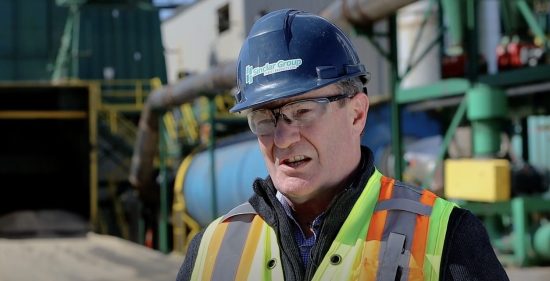Wood Pellet Association of Canada (WPAC) members never stop working and looking at innovative new ways to make our industry safer and stronger. The latest video in the Power of Pellets series, the Power of Pellets: Innovating Our Way to a Safer Better Product highlights some of the pioneering safety initiatives underway over the past two years that demonstrate this unwavering commitment. The video focuses on four main areas: combustible dust, deflagration isolation, belt dryer safety and off-gassing in transportation.
These are the stories from the people on the ground who are passionate about keeping each other safe so they can all go home to their families at the end of the day in the same condition as they came to work. I am proud of what we are accomplishing every day in safety from the forest to the pellet plants to ground-breaking research.
Premium Pellets in Vanderhoof is one of the Sinclar Group of Forest Products plants that manufactures quality wood pellets for both domestic and global markets. As general manager of lumber operations Dave Herzig puts it, it’s really about employees engaging in the safety culture. “It’s safety by choice, not by chance.”
Premium Pellets production supervisor Mike Fantillo witnesses that culture change every day. “Everything that we do, starts and ends with safety so all of our people go home safe at the end of each day; everything that we do focuses on that.”
Safety, as we all know, requires us all to make it a priority. It’s that collective commitment and action that influences outcomes and the successful implementation of safety management systems.
“Over the years, the most significant safety change would be the engagement at the floor level,” notes Herzig. “Trying to drive safety from the bottom up, giving people more autonomy over what they can control as opposed to that structure of top down.”
WPAC members openness to share and learn has galvanized much of this frontline work. In conjunction with the BC Forest Safety Council, Dalhousie University, OPEX Risk, Dust Research Ltd., WPAC worked with a range of stakeholders in the wood pellet industry and combustible dust management sector to undertake a study examining deflagration isolation and how it can help enhance the safety of wood pellet operations. Much of this work has been supported and funded by WorkSafe BC.
In addition, world-leading research by Fahimeh Yazdan Panah, Ph.D, director of research and technical development for WPAC, has resulted in a new global standard in the safe transportation of wood pellets.
According to all these people who work tirelessly to improve systems and communicate best practices, there is just no point making a product if you can’t do it safely.
Herzig sums it up like this: “There’s a good group of people here that are passionate about looking after each other and doing the right thing for the right reason.”
Watch the video below:
Gordon Murray is the executive director of the Wood Pellet Association of Canada.
This article was originally published by Canadian Biomass, a national media brand providing coverage of the emerging biomass, bioenergy and bio-products markets. See CanadianBiomassMagazine.ca for more information.

